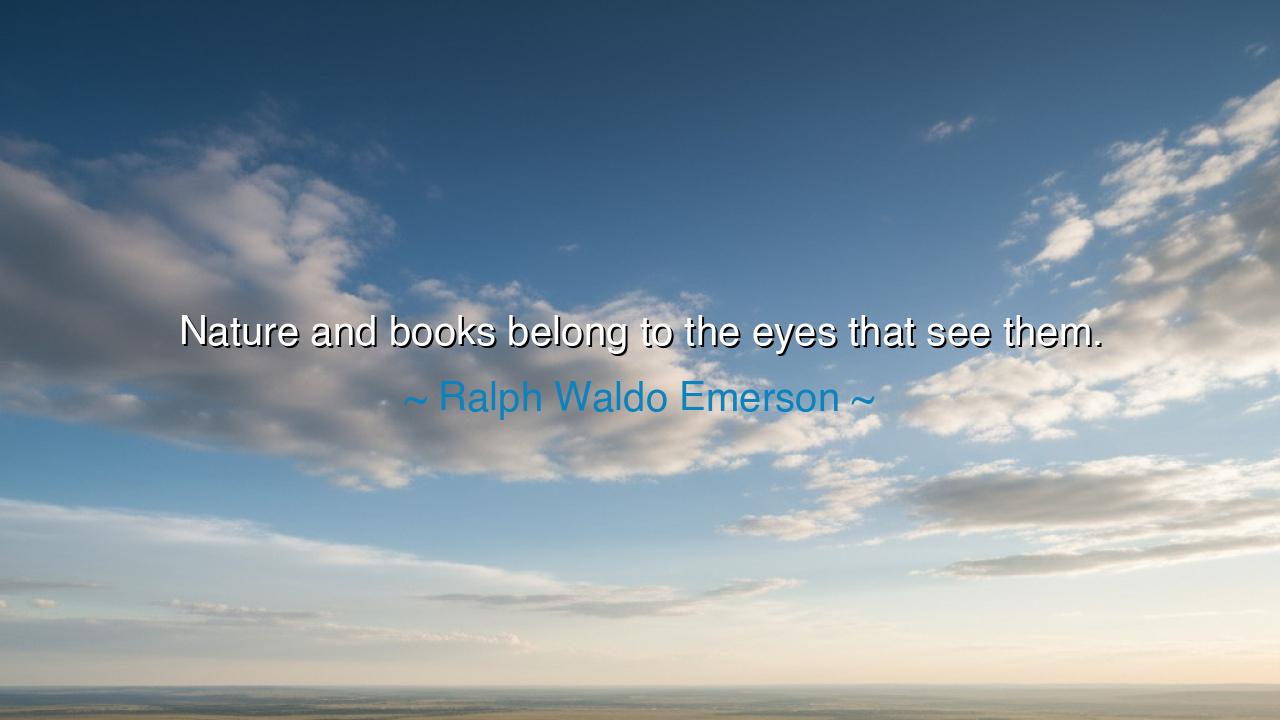
Nature and books belong to the eyes that see them.






Ralph Waldo Emerson, sage of Concord and prophet of the American spirit, once declared: “Nature and books belong to the eyes that see them.” In these few words he wove a teaching that is at once simple and eternal: that truth is not found merely in the object, but in the beholder; that the wealth of the world lies not in its abundance but in our power to perceive it. The forest may stand in silence for centuries, the library may rest upon its shelves, but they live only when awakened by the attentive gaze of the soul.
To say that nature belongs to the eyes that see it is to remind us that the meadow, the mountain, and the sky are not truly ours unless we behold them with wonder. The man who rushes through the woods without seeing the light in the leaves owns nothing, though the land be his by law. Yet the child who pauses to watch the flight of a bird, who marvels at the curve of a stone, possesses more than the richest king. Emerson, master of transcendental vision, urges us to remember that beauty and wisdom are gifts, but gifts received only by those who choose to see.
So too with books. A volume of Shakespeare, Dante, or Homer means nothing to the one who glances and forgets. Its power lies not in the ink or the paper but in the soul of the reader who enters its world. Each reader summons forth a different truth, shaped by the lens of their own life. Thus Emerson teaches that wisdom is not locked in words—it lives in the eyes that awaken them. For the book unread is as silent as the tree unseen; but when opened with a seeing heart, it becomes a universe.
The ancients themselves bore witness to this law. Socrates proclaimed that the unexamined life is not worth living, for without attention, truth passes by unnoticed. The Stoics trained themselves daily to look at the world rightly, seeing in hardship not cruelty but instruction. And in the East, the sages of Zen declared that enlightenment could be found in a single flower, if only one truly sees. Emerson’s teaching flows from this same river: perception is not passive, but creative—it shapes what we possess of nature and of wisdom.
History, too, gives us vivid examples. Helen Keller, blind and deaf, might have been condemned to darkness. Yet through the fierce guidance of Anne Sullivan, she learned to see without eyes, to hear without ears. For her, every touch became a vision, every word spelled into her palm a universe. She proved Emerson’s words beyond all doubt: that books and nature belong not to those who merely look, but to those who truly behold.
There is a heroic challenge in these words. Too often, we live surrounded by miracles yet blind to them. We walk through libraries without reading, through gardens without noticing, through lives without gratitude. Emerson calls us back to our inheritance: the kingdom of sight, which is not the mere act of looking but the deeper art of perceiving. The wealth of the world is not measured in possessions but in perceptions.
The lesson for us, then, is this: cultivate the eye that sees. Do not hurry past the tree without noticing its branches, nor skim the page without tasting its meaning. Train your senses to linger, your mind to attend, your heart to awaken. Carry a book and open it. Walk in nature and pause to look. Let perception become your possession. For in the end, the world belongs not to those who own it, but to those who see it.
Thus Emerson’s words resound as both reminder and call to arms: “Nature and books belong to the eyes that see them.” May we be among those whose vision is awake, who inherit not just the earth and the wisdom of ages, but the fullness of life itself, by the simple and profound act of truly seeing.






AAdministratorAdministrator
Welcome, honored guests. Please leave a comment, we will respond soon